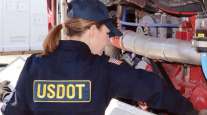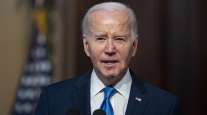Law Enforcement Officials Reluctant to Back National Heavy-Truck Speed Limiter Mandate
This story appears in the Oct. 3 print edition of Transport Topics.
AUSTIN, Texas — Law enforcement officials were reluctant to endorse a safety group’s push to require speed limiters on all heavy trucks in the United States, in part because of the speed differential it could create on highways.
“This is just excessive,” Wes Bement, a traffic investigator at the Grand Prairie, Texas, police department, told Steve Owings after a Sept. 27 presentation at the Commercial Vehicle Safety Alliance’s annual meeting here. “Whether the truck’s going 15 mph faster than the car or 15 mph slower than the car, you’ve still got a speed differential there.
“You’re going to have collisions out there. That is not safe,” he added.
Owings is the co-founder of Road Safe America, a group that has backed a national speed limiter mandate. The proposal would require all Classes 7-8 commercial vehicles to have their speeds capped at 65 mph. Road Safe America petitioned the U.S. Department of Transportation to set the mandate in 2006, and the agency agreed to explore the possibility in January (1-10, p. 1).
“The United States is the only highly industrialized country on earth without any requirement that speed limiters be set on heavy commercial vehicles,” Owings said to CVSA’s committee on drivers and traffic enforcement.
“In the [United Kingdon] and Australia, they reported higher than 25% reductions in crashes involving heavy commercial vehicles since implementing this requirement,” he added. The United Kingdom saw a 66% drop in fatal crashes involving heavy vehicles after its speed limiter regulation took effect, he said.
CVSA said its board did not take any action on speed limiters because it wanted to evaluate more data.
Capt. Wayne Andrews, commander of commercial vehicle enforcement for the Indiana State Police, said he was leaning against the limiter idea, but said he also was interested in more information about scientific studies.
“Sometimes you have to go over the speed limit to avoid a crash if traffic is moving at the speed or above a lot of time,” said Andrews, a former commercial truck driver. “It very well could be a serious problem if all you have is 65 mph.”
“It takes out a whole range of potential hazards that you cannot avoid,” he said.
American Trucking Associations also made a similar request in 2006, with a target speed limit of 68 mph. The National Highway Traffic Safety Administration expects to propose a regulation in the topic in December, according to DOT’s rulemaking agenda.
“I think it’s important to acknowledge that our members called for this for a number of reasons, including cost considerations,” Rob Abbott, ATA’s vice president of safety policy, said at the session. “They would not advocate for this if they thought it would increase crashes.”
A series of groups including ATA, the automobile group AAA, the Insurance Institute for Highway Safety and Advocates for Highway and Auto Safety support the proposal, but only the Owner-Operator Independent Drivers Association has come out in opposition, Owings said.
“It’s about speed differentials,” Joe Rajkovacz, director of regulatory affairs for OOIDA, told the committee. “That’s what causes accidents.”
Speed limiters would also slow down trucks and the movement of goods, he said.
“You’re going to slow down goods movements significantly, which in turn means you’re going to end up eventually with the supply chain needing more commercial vehicles on the road,” Rajkovacz added.
Owings also sought to address CVSA concerns over enforceability of the potential regulation.
Speeds of heavy vehicles manufactured since 1992 can be limited by devices that have already been installed, Owings said, but those are not entirely tamper-proof. A regulation would require tamper-proof ones.
Apart from that, if most trucks are traveling at the same speed, it would be easy for an officer to spot the ones going faster, Owings said.
“It seems like an enforceable thing to us,” he said.




